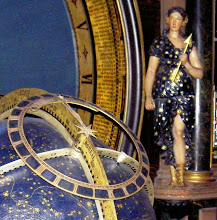
We come now to the next installment of the wonderful Sustainable Communities Act process and what the good burghers of hereabouts are doing about it. To refresh your memory: this is the new act under which suggestions are being asked, once a year, for changes in national law that would enable improvements to be made on a local scale, with the first lot being requested by 8th May. Do have a seat (this one's from a nearby private park!).
Anyway, back to the Act: people rose to the occasion with alacrity, with hundreds of ideas being sent in to the local council. It all happened so quickly that the person on whose desk they arrived hadn't had time to look through the brief, and on being asked to select the best 50 or so ideas, rejected them because "They're beyond our powers and would require national legislation..." Ooops!
After a quiet word-to-the-wise, it was all sorted and 48 ideas went through to the next stage. Which it has to be said our City Council carried off with quite some style. About 50 of us, some of whose organisations had sent ideas in, and some who sit on a long-standing panel (erm...bad metaphor day!) of semi-permanent consultees, were invited along to a beautiful old hall for an evening's brainstorming, munchies provided. We sat like wedding guests at several round tables, each of which had a bunch of the ideas that fell together into a theme (such as "Transport" or "Local taxes and economy"), and we read through the list of ideas and offered our thoughts, while someone from the Council "facilitated" (I'm trying to think of something like a Chair only less bossy) and took notes.
Some of the ideas were quite radical (for example letting the Council keep all the business rates and landfill tax), while some looked like out-and-out Spam (for example allowing only compressed-air-powered cars in the city centre, letting one firm who allegedly make the things set up a factory in our midst). Some of the ideas really appealed to Lunchista and I was, quite rightly, put on the spot and asked to explain why!
It transpires that the next step in the proceedings is for the most popular of the 48 ideas to go up on a website, where we can offer further comments. These in turn will be used by the Council to put together a 6500-word case for the best ones, to be sent to HMG Central.
Now a lot of people get all cynical about consultations, and with reason. Lunchista, however, is only cynical about some consultations. For example:
Like many other places, our city is in the throes of putting together something called a Local Development Framework. For several years leading up to this, it had been on the point of completing a Local Development Plan, but then "It Was Decided" (by HMG Central) that this wasn't complete enough, so Local Development Framework it was, then. This meant starting all over again, and a lot of people in our city council had to temporarily put aside the mundane business of running our libraries, old folks' homes, rubbish-collection and addressing the rather urgent question of how to avoid having us all disappear underwater. Then, just yesterday, a survey arrived at Chateau Lunchista on which the public could register our views. It was a classic. Here is the first question:
"Key Themes:
1. Building confident, creative and inclusive communities
2. A prosperous and thriving economy
3. An environmentally friendly city
4. Special historic and built environment
Question: Do you think these are appropriate?"
Now in all honesty how could you say "No" to those? And yet, when someone wants to build a massive out-of-town supermarket, for example, they could easily say (or more accurately write, ideally in a glossy brochure with lots of pictures, including that one of the child blowing dandelion-seeds) that they were addressing all four of these points.
Many of the subsequent questions asked if we want more of something. This was done by first saying "There will be x more of this", and then asking "Is x too high, too low or about right?" Why on earth does this remind Lunchista of that sketch ("Well, which result do you want, Minister?") from Yes, Prime Minister?
Right, enough of the cynical divertissement, and back to the nuts and bolts. Done properly, as our Council's Sustainable Communities Act excercise seems to be doing, a consultation will give a government proper information, which with a bit of luck can be turned into genuine knowledge.
But there's more. Anyone remember how absolutely confident Saddam Hussein appeared during the Iraq invasion, right up until practically the very day of his defeat? He was no actor: that confidence was genuine. It came from the simple fact that no-one ever wants to break bad news to a dictator: no-one could tell him that the current course of action wasn't working. It's the same in any aspect of life: a system which has no negative feedback, in the face of even the tiny, everyday changes that it should be able to correct for, is bound to go unstable in the end and fail. Even if the road is straight, driving without a steering wheel would be a dodgy proposition.
I would like to think that this is what well-designed consultations, held with honest motives, do in the long run. Tapping into our collective know-how means we can keep looking, and keep steering. And who says the road's straight anyway?


No comments:
Post a Comment